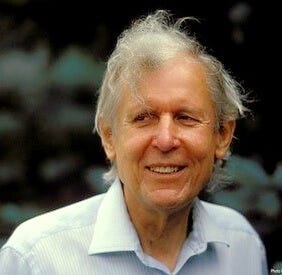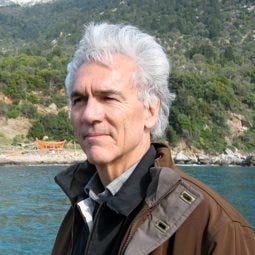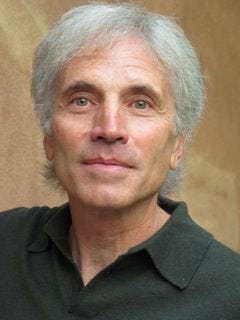Thomas Berry's "Biospiritual" Vision Beckons us Towards a Better Future
A first pass at Berry's complex, influential philosophy, uniting physics & metaphysics into a unified "dream of the Earth" and "story of the universe."
In his preface to The Great Work: Our Way into the Future, published on the cusp of the 21st century, Thomas Berry writes:
As in creating some significant work the artist first experiences something akin to dream awareness that becomes clarified in the creative process itself, so we must first have a vision of the future sufficiently entrancing that it will sustain us in the transformation of the human project that is now in process. Such an entrancing vision we propose here as the Ecozoic Era, the period when humans would become a mutually beneficial presence on the Earth. That future can exist only when we understand the universe as composed of subjects to be communed with, not as objects to be exploited (x).
In this important book, which he published at the mature age of 85, Berry lays out his vision of education as a crucial social space for in which the relationship between humans and our planet, and indeed our cosmos, can be healed from the alienation caused by the rise of science and the industrial, extractivist economy.
Reading Thomas Berry in 2023, I suppose it’s a good thing that much of his analysis about the destructive presence of humans on the planet seems familiar. He was far ahead of his time in seeing how the consumerist economy and the materialist, soulless scientific attitude towards the natural world was endangering the entire Earth community.
We still have not caught up to him when it comes to his remedies, however. For example, when it comes to education for the 21st century, Berry writes: “The basic course in any college or university would be the story of the universe. This story can fulfill its role only if the universe is understood as having a psychic-spiritual as well as a physical-material aspect from the beginning (81).
On one level, “the story of the universe” is the story of cosmic evolution from the Big Bang to the present moment, including the entire history of our planet Earth. But told by Thomas Berry and his disciple, the mathematician and cosmologist Brian Swimme, the universe story is also a story of spiritual unfolding. “The evolutionary vision provides the most profound mystique of the universe…. We need to experience the sequence of evolutionary transformations as moments of grace, and also as celebration moments in our new experience of the sacred” (170).
Only when we humans come to understand ourselves as integral to the sacred story of the emerging universe will we have the psychic energy and the will to replace “the distorted dream of an industrial technological paradise” with “the more viable dream of a mutually enhancing human presence within an ever-renewing organic-based Earth community,” Berry says (201).
Universities could be the site where this new understanding develops, but not as they presently exist. Berry lays out the choices quite flatly.
The universities must decide whether they will continue training persons for temporary survival in the declining Cenozoic Era or whether they will begin educating students for the emerging Ecozoic. Already the planet is so damaged and the future so challenged by its rising human population that the terms of survival will be severe beyond anything we have known in the past. We have not thought clearly or behaved properly in the 20th century. We are now caught in a mind-tormenting ambivalence. We have such vast understanding of the universe and how it functions, and yet we manifest such inability to use this knowledge beneficially either for ourselves or for any other mode of earthly being. While this is not the time for continued denial by the universities or for attributing blame to the universities, it is the time for universities to rethink themselves and what they are doing (85).
Berry gives some concrete suggestions for reinventing education in all fields so that the focus is on serving the Earth community. He was an advocate for what we now call “the Rights of Nature” long avant la lettre. Most importantly, he calls on the university to become “the context in which the universe reflects on itself in human intelligence and communicates itself to the human community” (81).
Brian Swimme ran with Berry’s ideas about making the story of the universe the primary narrative to be explored in education, in his books such as The Universe is a Green Dragon, Hidden Heart of the Cosmos, and The Universe Story, co-written with Thomas Berry. In forthcoming posts I will be following Swimme’s trail in thinking more deeply about education as a path of initiation into the sacred Earth community.
I’ll also be unpacking the work of depth psychologist Bill Plotkin, who was also deeply influenced by Thomas Berry, as is apparent in his books (which include Nature and the Human Soul, Wild Mind, and The Journey of Soul Initiation) as well as his lifework via the Animas Valley Institute as a wilderness vision quest guide.
Plotkin is particularly alert to Berry’s comments about the importance of “wildness” as a fundamental property of the universe that humans need to make peace with.
“We are not here to control” and dominate wild Nature, Berry says. “We are here to become integral with the larger Earth community. The community itself and each of its members has ultimately a wild component, a creative spontaneity that is its deepest reality, its most profound mystery” (48).
Berry sees “wildness…as the root of the authentic spontaneities of any being. It is that wellspring of creativity whence come the instinctive activities that enable all living beings to obtain their food, to find shelter, to bring forth their young; to sing and dance and fly through the air and swim through the depths of the sea. This is the same inner tendency that evokes the insight of the poet, the skill of the artist, and the power of the shaman” (51).
And even in “nature’s violent moments,” Berry says, “something in the wild depths of the human soul finds its fulfillment….This we need to know: how to participate creatively in the wildness of the world about us. For it is out of the wild depths of the universe and our own being that the greater visions must come (51).
In the age of catastrophic climate disruption, Berry has some comfort for us. Catastrophes prompt creativity, he says. Our desperate, crisis-ridden times are calling forth “a new revelatory experience… wherein human consciousness awakens to the grandeur and sacred quality of the Earth process. This awakening is our human participation in the dream of the Earth, the dream that is carried in its integrity not in any of Earth’s cultural expressions but in the depths of our genetic coding. Therein the Earth functions at a depth beyond our capacity for active thought. We can only be sensitized to what is being revealed to us. We probably have not had such participation in the dream of the Earth since earlier shamanic times, but therein lies our hope for the future for ourselves and for the entire Earth community” (165).
I will have more to say about Berry’s ideas about genetic coding / “spontaneities” / psychic intuition in relation to the “biospiritual” Earth and cosmos. For now, let’s just sit with the momentary uplift in the idea that we humans have the potential to turn our current nightmares into numinous initiation through the story of the universe and the dream of the Earth.
May it be so.







There is a flow to this day I have been waiting to arrive for well over a decade. It started with beginning to read Roll May's The Courage to Create this very morning, followed by listening to an interview with him, that touched deeply in my heart and soul. Then to find beloved Thomas on the heels of this. I share this link, because I sense it will touch you as well. With deep appreciation and respect. Rollo May: The Human Dilemma (Part One Complete): Thinking Allowed with Jeffrey Mishlove - YouTube
https://www.youtube.com/watch?v=HH-9XkjqYHY
Thank you so much for this, Jennifer. This message needs to be heard by teachers all over the earth. The message of creativity and hope is expressed in Pierre Teilhard de Chardin's poetic work called "Building the Earth." I'm looking forward to learning more about "genetic coding / “spontaneities” / psychic intuition in relation to the “biospiritual” Earth and cosmos." The word "biospiritual" says so much about what Brian Swimme and others call the noosphere, a combination of biosphere and planetary mind – a Teilhardian word. To learn more about Human Energy and planetary conciousness, access this full audio recording of Teilhard's Building the Earth on YouTube, here: https://youtu.be/EMsLh52inx4